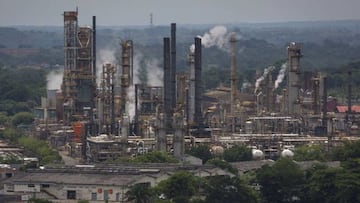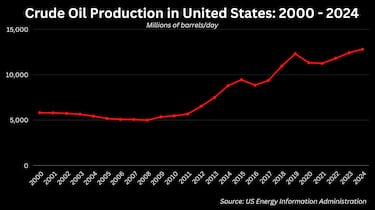US companies plan to increase crude oil production to record levels by 2024
The US Energy Information Agency projects US will break crude oil production records by 2024. Market impacts and consequences for the climate....


By 2024, the US Energy Information Administration (EIA) projects that the country will produce a record-breaking 12.81 million barrels of oil a day, up from the current average of 11.86 million.

Recent news follows the Russian invasion of Ukraine, which disrupted energy markets. In response, US companies seek to compensate for the gap caused by European sanctions against the Kremlin. The White House aims to encourage production and reduce fuel costs for consumers by offering a deal to producers. If they can lower the price to around $70/barrel, the federal government will purchase millions of barrels to refill the national strategic reserve.
The EIA expects these increases in production to reduce the Brent crude oil price by around eighteen percent this year compared to last. The impact for drivers will be apparent, with gasoline prices projected to fall from nearly $4/gallon in 2022 to $3.30/gallon in 2023 and $3.10/gallon in 2024.
Announcement comes as communities around the world grapple with extreme weather
Extreme flooding in Pakistan, California, and New Zealand, are just a few reminders of the devastating impacts climate change will bring to communities all over the world. As emissions grow, the probability that current generations can keep warming under 1.5ºC becomes less likely. Scientists have warned that warming above this level carries untold consequences and will do irreparable damage to the world’s ecosystems.
The massive flooding events across Pakistan in October 2022 impacted more than thirty-three million people and left an area the size of the United Kingdom submerged under several feet of water. The severe weather had devastating humanitarian consequences, leaving more than fourteen million people dependent on emergency food aid delivered through the World Food Program. The UN agency has reported a funding gap of $108 million, which must be closed “to prevent further deterioration in the food security situation and an impending humanitarian crisis.” To date, no governments have stepped up to provide this aid.
Related stories
While the recent storms in California were not caused by climate change, the dryer-than-normal conditions seen in the state over the past two decades contributed significantly to the damage caused. Climate scientists have reported their concern with the rapid increase in the number and scale of wildfires across the state. In 2020, the levels recorded were closer to what many climate models had projected the state would experience in the latter half of this century. The intensity of drought conditions and fires are thought to be made worse by climate change, and such conditions can leave the ground unable to absorb as much water, which can make high-rain fall events more catastrophic. Researchers across the state worry that rapid fluctuations between dry and wet periods may become more frequent over the coming decades, warning that “future generations have huge problems ahead of them.”
Shifting the blame to climate change
However, what public leaders should avoid is blaming climate change for their failures to ensure that the state’s infrastructure can handle normal weather events. As a country’s roads, bridges, waterways, levee systems, and other critical infrastructure age and begin to fail, there may be a temptation to say that the devastation was unavoidable. These excuses should not be tolerated because climate change by no means justifies political failures that lead to avoidable deaths. Climate scientists have and will continue to equip policymakers with a mountain of data on the impact that increased emissions will have on the climate, making failures to protect residents a negation of responsibility by the political establishment.